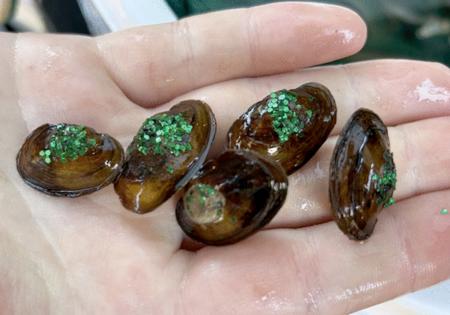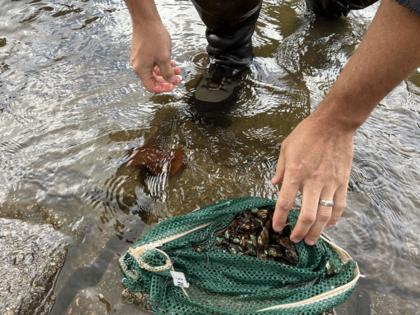'Groundbreaking' stocking brings freshwater mussels to Pennsylvania's Kiski and Clarion rivers
Published in Outdoors
PITTSBURGH — More than a dozen biologists and volunteers waded into the Kiski and Clarion rivers recently to do what has never been done before — stock native freshwater mussels.
The recolonization of the mollusks will improve water quality and fish habitat, and help restore the waterways.
In the last several weeks, about 2,000 mussels were placed by hand in the two rivers by the Pennsylvania Fish and Boat Commission, the Western Pennsylvania Conservancy and volunteers from the Governor's Youth Council for Hunting, Fishing and Conservation.
"It's a really special day putting these mussels out to see how they do over time so we can put in tens of thousands in the future," said Eric Chapman, the Conservancy's senior director of aquatic science, at the Kiski River.
The biologists stocked the Kiski and Clarion rivers with three species of native mussels — fatmucket, wavy-rayed lampmussel and plain pocketbook.
Mussels improve water quality by filtering fine silts and algae through their gills. Depending on the species, a single mussel can filter from 3-20 gallons of water daily, Chapman said.
A healthy, dense mussel bed can provide very effective filtration, he said.
"They make water cleaner for free for people because the mussels filter feed and clean things as they live."
Over two centuries ago, industrial pollution wiped out most aquatic life in those two Allegheny River tributaries. With cleaner water these days, mussels are reappearing, but slowly.
In the last five years, Commission and Conservancy biologists turned up a surprising 12 mussel species during surveys in the Kiski.
Chapman said that a small number of mussels, only two species, were found in the Clarion in 2013 and 2014 in over 10 miles of river surveys.
Stocking mussels will hasten the mollusks' return.
"This is groundbreaking work happening in Pennsylvania right now," Chapman said.
Only about 35 sites, most federally operated, propagate native mussels for recolonization in the country, said Scott Ray, a species recovery biologist at the Commission's Aquatic Conservation Center in Union City, Erie County.
The Commission began to convert the old fish hatchery in 2017 to propagate mussels to stock the western side of the state.
In Western Pennsylvania, three sites have been stocked so far: the Kiski and Clarion rivers this year, and Dunkard Creek in 2022.
Grants from the National Fish and Wildlife Foundation and the Colcom Foundation as well as the Pennsylvania Fish and Boat Commission have paid for the mussel surveys, propagation, stocking and an upcoming tree planting in the Kiski River watershed.
Mussels can be stocked?
Mussel stocking is like game fish stocking, well almost. There are some important differences.
Game fish are poured into waterways; mussels are planted. They are not caught or eaten like fish.
"We are hand-planting each one in the substrate to give them the best chance for survival so they do not wash away," Chapman said at the Kiski River.
"The mussels use their 'foot' to grab ahold of the substrate and start filter feeding within less than a half hour."
In the Clarion and Kiski rivers, the biologists strategically embedded the mussels within 9- by-12-foot temporary rope grids, varying the mussel density in each cell.
"Based on the density of the grid, we will determine how many we can stock down the road," Ray said.
Chapman added that available food — algae — will determine how many mussels can survive.
The biologists will check their growth and survival over the next several years to determine how many more mussels the Kiski and Clarion rivers can support.
The Commission dabbed green glitter on the shells to identify the year they were stocked.
Tiny PIT tags, the same variety implanted in people's pets, were glued to them as well to identify individuals via scanner to gauge their growth and survival.
Making history
At the turn of the 20th century, the Clarion and Kiski rivers were plagued by deforestation along the banks and pollution from coal mining, tanneries and other unregulated industrial waste, Ray said.
The Clean Water Act and the exhaustion of coal mining in some areas charted a cleaner future.
Then, over the last several decades, local nonprofit watershed groups performed water testing and landed state grants to clean up some of the mine discharge.
In recent decades, fish became more abundant in many area rivers, but something was missing.
In only the last five years, researchers found signs of new life, freshwater mussels in the Kiski.
Harbingers of improved water quality, their return delighted biologists.
"We have a lot of rivers that are devoid or have slow-growing mussel populations where they used to be," Ray said.
When applying for the mussel stocking grant, Ray said they picked the Kiski and Clarion rivers because historically the waterways had healthy mussel numbers.
The grant provides funds to stock 40,000 mussels in both rivers over four years.
(c)2024 the Pittsburgh Post-Gazette Distributed by Tribune Content Agency, LLC.










Comments